29 Alternative & Compressed Work Week Schedules
On September 25, 1926, Henry Ford announced his company would start working a five-day, 40-hour work week. The five-day work week was born and it was a breakthrough, clearly! It’s been friggin’ 95 years to the day, and we’re all still doing it.
But as we approach a century since the preeminent work schedule was invented, people are finally starting to question it. After all, Ford employees worked on an assembly line. Today, 25% of Americans work from home, and 36% make a living through freelance work.
See Also: How We Implemented The Four-Day Work Week
When, where, and how much we work is overdue for some evaluation. Many companies have implemented alternative work schedules with fewer hours or schedules with the same amount of hours compressed into fewer work days.
Looking for a remote, alternative-schedule job?
Take a look at FlexJobs, the world’s biggest job board dedicated to remote and flexible work. You’ll find dedicated filters to “flexible” and “alternative” schedules.
Search for four-day work week jobs on FlexJobs.
Here are some quick notes:
- This article specifically looks at company policies at the top followed by entrepreneur ideas at the bottom
- We don’t look at shift-work schedules (like the 2-2-3 schedule) for hospitals or police departments, for example (this post is jobs that can be done remotely)
- For each, we’ll show the work week on a calendar and give an example of a company using that type of schedule
Use the table of contents below to jump to one that interests you.
What type of alternative work schedule would you like to learn more about?
- 4-day work week (32-hour schedule)
- 3-day work week
- 4-10 schedule (compressed work week)
- 9-80 work schedule (5-4/9 schedule)
- 9-72 work schedule (every other Friday off)
- Half-day Friday policy (36-hour work week schedule)
- Summer Friday policy
- 4-hour work week (good book!)
- 19 ideas from entrepreneurs
- No work schedule (Output > hours)
4-day work week (32-hour schedule)
What is the 4-day work week schedule?
A company considers only four days of the week as work days. In most cases, four-day companies don’t work Friday — giving employees a three-day weekend. A four-day week technically could come with any amount of hours, but for this post, we’re saying it is 32 hours per week. You’ll find other four-day formats below with different hour amounts. (There are some real benefits to the four-day work week, by the way.)
What real companies do the 4-day work week?
See: Every Company Doing A 4-Day Work Week
| Read: 32-Hour Work Week: The Complete Guide |
3-day work week schedule
What is the 3-day work week schedule?
People only work three days out of seven, regardless of the hours they put in during those days.
Does anyone do the three-day work week?
Maaemo does a three-day, 45-hour work week.
Richard Branson has talked about it, but it doesn’t sound like Virgin actually does it. While I’m sure many freelancers and business owners work this schedule, it’s hard to find a company with a set three-day schedule.
| Read: 3-Day Work Week: The Complete Guide |
4-10 work schedule (compressed work week)
What is the 4-10, compressed schedule?
An employee works 10 hours a day over the course of four days, then is off for three days each week. This keeps the typical 40-hour work week in a compressed form. There are positives and negatives to a compressed week.
What companies do a 4-10 schedule?
Elephant Ventures (Permanent)
City of Morgantown, West Virginia (Trial)
| Read: 4-10 Work Schedule: Complete Guide |
9-80 work schedule (5-4/9 schedule)
What is the 9-80 (also known as the 5-4/9) schedule?
During a two-week period, the employee works 80 hours across nine days instead of 10. The plan is to spread eight hours of work — typically done on a Friday — across the other nine days in the period to earn an extra day off every other week. The most common way to do this is four nine-hour days followed by an eight-hour Friday. The next week, employees work four nine-hour days, followed by a Friday off.
What are some organizations that offer the 9-80 work schedule?
The City of Coronado, CA (city employees)
| Read: 9-80 Work Schedule: Complete Guide |
9-72 work schedule (every other Friday off)
What is the 9-72 schedule?
This is where employees have a normal five-day, 40-hour week followed by a four-day, 32-hour week. In other words, every other Friday is off with normal work days outside of that. If you have positions that are required to be on during normal work hours (like client work or support), you could have half of your team on each Friday for coverage.
What’s an example company that takes off every other Friday?
See Also: 20 Creative Twists On The 40-Hour Work Week or Working 60 Hours Per Week
Half-day Friday policy (36-hour work week schedule)
What is the 36-hour work week?
Full-time employees work 36 hours per week rather than 40. Typically, the work day ends at lunchtime on Friday. It’s an opportunity to give people a compressed amount of time to work on Friday before enjoying the afternoon off. Typically, Friday afternoons are the least productive time.
What’s an example company that does the 36-hour work schedule?
Iceland (the country, on a trial basis)
Buffer did half-day Fridays before switching to 4-day, 32 hours
JK Tech does a form of the half-day Friday policy (nine hours Mon-Thur, four on Fri)
| Read: The 36-Hour Work Week (Half-Day Fridays) |
Summer Friday policy
What is a summer Friday schedule?
During the summer months only, a company will offer some form of Fridays off. It’s a seasonal change to the work week schedule. This could be offered in the form of a seasonal 4-10, 9-80, 9-72, or by simply cutting Fridays from the schedule during the summer months.
Which companies offer Summer Fridays?
4-hour work week

This book is for entrepreneurs, freelancers, and business owners (current and striving) about how to operate your business so that it doesn’t require your time. I’d recommend it!
19 alternative schedule ideas from entrepreneurs
I asked a list of entrepreneurs to share the unique schedules they work during the week. I received 103 responses but only used the most notable schedules below. I wanted to add this section specifically for entrepreneurs from entrepreneurs. Whereas all of the ideas above are used as company policies for employees, these real schedules below are used by business owners who can structure their days however they choose.
You-shaped schedule
15 hours per week over Tuesday, Wednesday, Friday
For years, I worked as much as I could, trying to squeeze as much out of myself as I possibly could. However, my health started to go downhill — not to mention my mental health! After becoming a mother, I was determined to break this harmful pattern and show my kids I could be successful without burning myself out or ruining my relationships in the process. That is why I prefer the “you-shaped” or “me-shaped” work schedule. It fits my family as well as my personal needs. Because my schedule is designed to prioritize my (mental) health, I feel great 99% of the time. This means that when I work, I can focus, be productive, and get things done quickly. I rarely waste any time staring at my screen because I don’t know what to do or where to start. The “you-shaped” schedule allows me to show up fully and deliver results for my clients.
– Susanne Grant of Grant Method Coaching
—–
Where else does the 15-hour work week come from?
In 1930, economist John Maynard Keynes predicted his grandchildren would work 15-hour weeks due to advances in technology and productivity.
The anti-burnout
(20-hour work week)
20 hours per week over Tuesday, Wednesday, Thursday, Friday
When I put up the business, I promised myself to work at a comfortable pace to avoid burnout at all costs. After some trial and error, this is the schedule that worked best for me.
– Jack Miller of How I Get Rid Of
Where else does the 20-hour work week come from?
WorkReduce has trialed a 20-hour work week as a company policy. A small group of people have started the 20-Hour Work Week Movement encouraging people to start online businesses with 20 hours of work per week.
10-2
(20-hour work week)
20 hours per week over Monday, Tuesday, Wednesday, Thursday, Friday
My work is not dependent on office hours, so working 10-2 during the week allowed me to get up and go to the gym at a reasonable time (8 a.m. is a quiet time in the gym, as most people go in early, then go to their office job). Then I can come home, have a relaxed breakfast, and start work either at home or in a local cafe. I just need my laptop and Wi-Fi. Once I’ve finished my work in the afternoons, I can socialize, relax in a cafe, or work on other projects.
I still think it’s very important to get up at a reasonable time and keep a regular routine in order to sleep well and stay productive; otherwise, it would end up with me sleeping all morning and feeling extremely lazy. This would also impact my bedtime, too, as I wouldn’t be tired until the early hours of the morning. This week I’ll be starting a Mandarin class, which is four days per week from 9-11 a.m., so my working schedule will likely shift to 12-4. Even this change won’t have an impact on my afternoon activities, so in theory, I think the four-hour routine can be shifted earlier or later to suit the individual.
– Jordan Martin-Smith of FULLTIME.digital
Flexible 4-day work week
(25-hour work week)
25 hours per week over Monday, Tuesday, Wednesday, Thursday
After many years in the corporate world working well over 40 hours a week, I realized I was not productive 100% of the time. I run my own business now, which allows me to work on my own schedule while being productive 100% of the time. It turns out Mondays through Thursdays are my most productive days. I don’t necessarily stick to these four specific days or to specific times during the day, which is why flexibility is the name of the game. This also allows me to have free time I can spend on hobbies and with my loved ones. My team also works on a similar flexible four-day schedule.
– Rym Benchaar of My Coach Rym
Where else does the 25-hour work week come from?
Tower Paddle Boards and Rheingans Digital Enabler, a German digital consulting agency, both do a five-hour work day (Monday through Friday from 8 a.m.- 1 p.m.).
Flexible 4-day work week
30 hours per week over Monday, Tuesday, Wednesday, Thursday
The purpose of my schedule is to be as flexible as possible to help with my kids. If my toddler needs to take a nap but is struggling to fall asleep, I can take him on a bike ride. If my baby is having a hard day, I can take over for a few hours while mom takes a nap, etc.
– Corey Noyes of Balanced Capital
25 by 4
25 hours per week over Monday, Wednesday, Thursday, Friday
As a mom and full-time business owner, I needed a flexible, work-from-home schedule and a day of rest to run errands for home and my personal life. Most people schedule their time off on Fridays; however, Fridays are busy at our location, so an early weekday off works best for me. My schedule has allowed me to start the week off in the office, work from home midweek, and work a few hours on Fridays to connect with my staff. My schedule is flexible and gives me time during the week to connect with consulting clients, focus on operations, marketing, and — most importantly — family.
– Tamika Washington of ConverSpace
The healthy five
25 hours per week over Monday, Tuesday, Wednesday, Thursday, Friday
I used to work 60 hours a week when I owned an office furniture company. I was successful but miserable. I sold my company, started an online business, and promised my family that I would never sacrifice my home life to make money. This is why I started working five hours a day, five days a week.
– Jamie Hickey of Coffee Semantics
Flexible 5s
25 hours per week over Monday, Tuesday, Wednesday, Thursday, Friday
I usually work around 4-5 hours per day, but not at a specific time frame. For example, I might go through my email in the morning for an hour or two. Then I’m off from work until I need to brainstorm a project with the team in the afternoon. Sometimes I respond to emails again it the evening. This is one of the reasons I started my own business — because I can enjoy freedom and flexibility when working.
– Yeremia Poco of Eggplain
Intuitive time blocks
30 hours per week over Monday, Tuesday, Wednesday, Thursday
After being a high-achieving corporate climber and reaching a point of burnout, I recognized that my mental and physical health was suffering in exchange for a title and a paycheck. This led to me create rules for my business that support my well-being, so I can give to my business and clients purposefully and with excitement. The impact of this four-day intentional scheduling has not only benefited my mental and physical well-being — it has challenged me to be hyper-productive to achieve the results I want in a shorter period of time.
– Vanessa Santos of Start Up With Vanessa
The introvert schedule
30 hours per week over Monday, Tuesday, Wednesday, Thursday
I am an introvert, so I am constantly optimizing my schedule to align with my energy levels as well as my business needs. Currently, I limit meeting with clients to Tuesdays through Thursdays. This allows me to rest and recharge as well as work on projects Monday and Friday, if needed, or take three- to four-day weekends. Additionally, I am in a doctoral program, so I can fit in schoolwork on Mondays and Fridays as well as my dedicated homework day, Sunday.
I began my business as a remote side hustle on Fiverr charging five dollars for resume reviews and LinkedIn profile summaries. I now run a multi-six-figure coaching business from my home in Santa Barbara, CA. I am a trusted confidant to some of the biggest names in Silicon Valley and high tech. This schedule allows me optimal time to recharge as well as meet with my clients.
– Kyle Elliott of CaffeinatedKyle.com
11-6
30 hours per week over Monday, Tuesday, Wednesday, Thursday, Friday
I prefer to wake up without an alarm and enjoy a mindful breakfast, so 11 a.m. is a great start time for me. Stopping at 6 p.m. gives me plenty of time to read, relax, and spend time with family.
– Matthew Ramirez of Rephrase Media
6-day work week
30 hours per week over Monday, Tuesday, Wednesday, Thursday, Friday, Saturday
I opted to work five hours per day from Monday to Saturday to maximize my availability while still having time for my other priorities. As a business owner, I’m always working, and this schedule lets me maintain a balance that keeps me productive and motivated.
– Jake Smith of Absolute Reg
Split 3-day work week
30 hours per week over Tuesday, Wednesday, Thursday
I work from 8 .a.m-4 p.m., plus 7:30-9:30 p.m. three days a week. A split shift lets me work with international clients and be present with my young children. I meet with clients in the Americas in the morning, admin during the afternoon, and have family time in the evening. After my kids are in bed, I meet with my European clients. This schedule allows me to be present with my family, be productive and successful in my work, and enjoy more travel during a constant four-day weekend.
– Melanie Bruce of The Leveraged PhD
Flex work week
30 hours per week over Monday, Tuesday, Wednesday, Thursday, Friday
My work schedule gives me just the right balance between my personal and professional life. I can still be hands-on with my company and also enjoy my time with my family. It’s a great choice for people like me who have been in the industry for decades.
– Nunzio Ross of Majesty Coffee
2-day intervals
30 hours per week over Monday, Tuesday, Wednesday, Thursday, Friday, Saturday
Being a startup CEO gives me tons of opportunities to schedule my work week. I tested many kinds and finally found out that at least one day off every three days is the best. So, for example, I work on Mondays and Tuesdays, rest on Wednesdays, work on Thursdays and Fridays, and rest on Saturdays and Sundays. Of course, the schedule depends on my life- and work-related duties. But working for a maximum of two days in a row boosts me a lot! It has a super-positive impact on my work effectiveness and personal life quality!
– Rafal Mlodzki of Passport Photo Online
Flexible 4-day work week
32 hours per week over Monday, Tuesday, Thursday, Friday
The four-day work week has been proven to keep employees engaged and motivated with the promise of an extra day off. Four-day flextime work seeks to improve on this by giving employees even greater autonomy over their daily schedules. Rather than a standard 9-5, you’re free to choose the exact eight hours that you work so long as you get the work done. This ensures that work fits around your life rather than the other way around.
– Jerry Han of PrizeRebel
7-Day Work Week
45 hours per week over Monday, Tuesday, Wednesday, Thursday, Friday, Saturday, Sunday
Balance is the main reason I decided to work this schedule. I love getting up early and working out, as well as ending my day early to cook dinner and get outside. I feel happier and more productive each day because it doesn’t feel like a grind. I typically work a half-day on Saturday and a quarter-day on Sunday, mainly because I love what I do, but also to give myself a more prolonged break from work to reset my mind.
– Andy Kolodgie of The House Guys
I work with clients who are buying homes. They are looking for houses during their off hours, so I need to be available to them on weekends or evenings. During the day, I’ll push my loans through the process. I work a little each day, but overall I don’t work more hours than a regular job. I like this schedule as it affords me nice breaks throughout the day.
– Jeffrey Loyd of Mortgage Acuity
Siesta-style
55 hours per week over Monday, Tuesday, Wednesday, Thursday, Friday, Saturday
I enjoy working a little bit at night most evenings, so I shorten my working day and pick up a little bit at night, really establishing myself for a great start in the mornings.
– Andrew Taylor of Net Lawman
Compressed work week
56 hours per week over Monday, Tuesday, Wednesday, Thursday
I operate on a compressed work schedule where I put in 56 hours in four days. This allows me to have a three-day weekend, giving me plenty of time to pursue my other interests. Hence, I work from Monday to Thursday, 14 hours each, so that I can have Friday to Sunday off. With a three-day weekend, I get to rest, spend quality time with my family, and pursue my other hobbies comprehensively.
– Patrick Crane of Love Sew
No work schedule (Output > Hours)
All of the schedules above are great, but half-steps in the right direction.
I run a company that did half-day Fridays (32 hours per week) for years. Then we lopped off the four Friday hours to make it a four-day, 32-hour work week. Going from 36 hours to 32 hours was easy — our productivity and profitability continued on the same trajectory, our clients didn’t even notice, and all of our employees were very happy to have three-day weekends each week. It was unequivocally the right move.
But it’s a half-step because what we all have in front of us is the ability to get work done whenever we want. The hours and schedules go out the window and are replaced by personal accountability and contribution. Our company is moving that way — we have unlimited time off, we encourage people to turn off Slack and email, we push to remove unproductive meetings, and personal matters throughout the day take priority over work. If someone doesn’t come online for a full day, that’s totally fine.
We’re all held accountable to do our jobs well without extrinsic motivation from a manager or a set schedule. It’s a big leap in how we’ve worked, but it unlocks real freedom and opportunity for the employees and company.
View other unique work week schedulesThis is part of our series highlighting unique work schedules. Have a look:
|
What is your work schedule like?
Did we miss a work schedule that you use? We’d love to add your format and give you credit. Please fill in the form on this page for a chance to be included in this article.

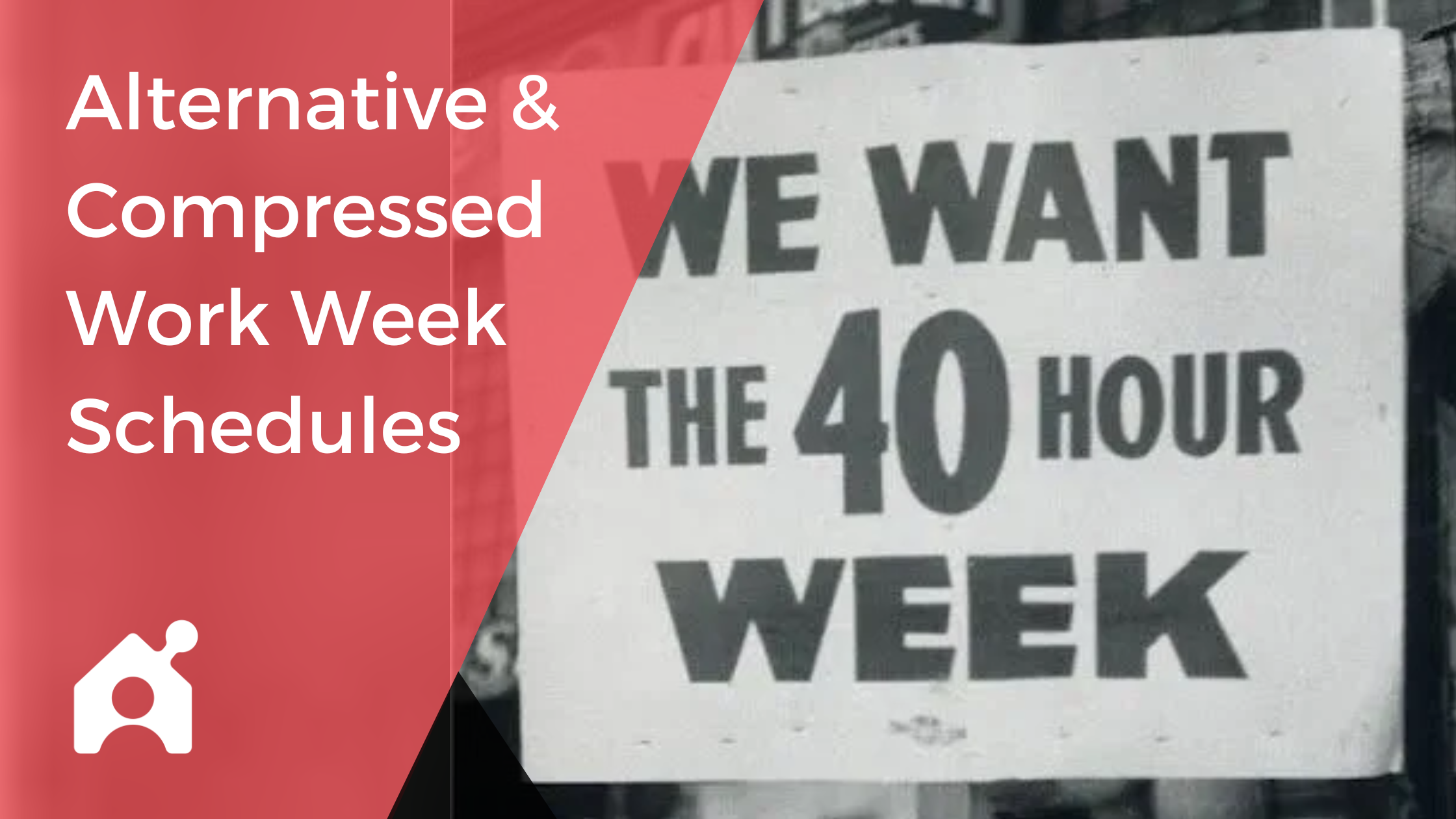
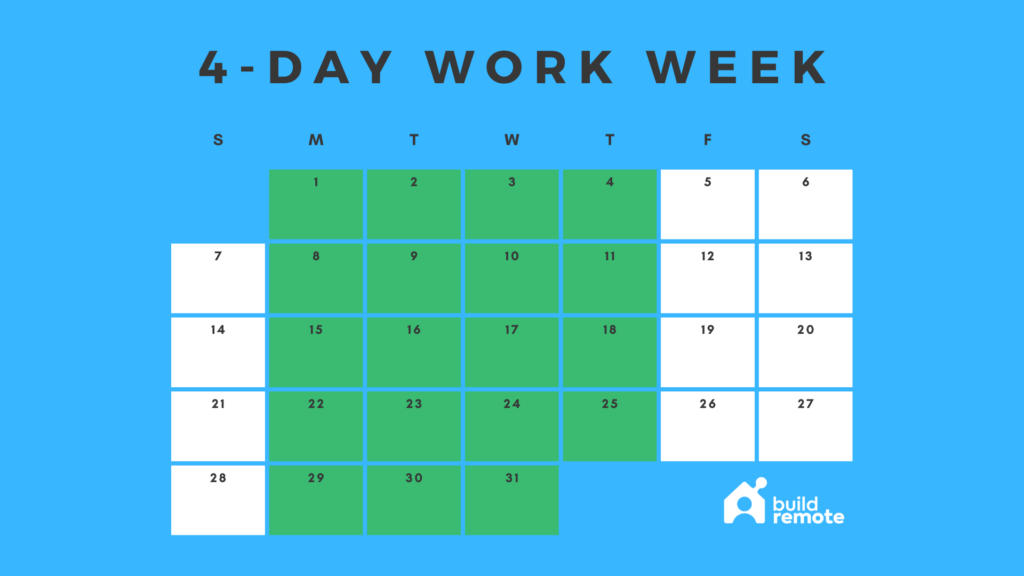
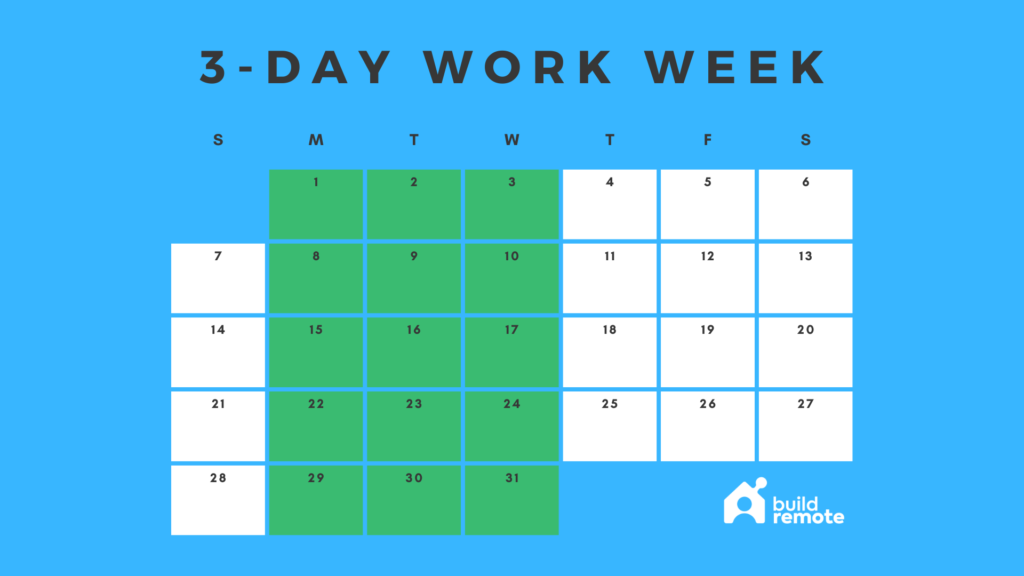
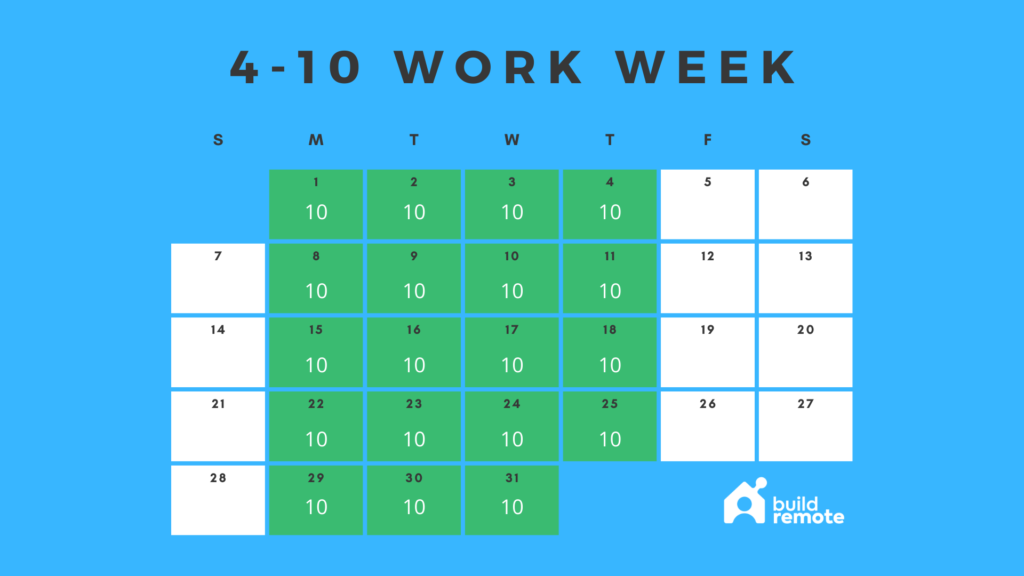
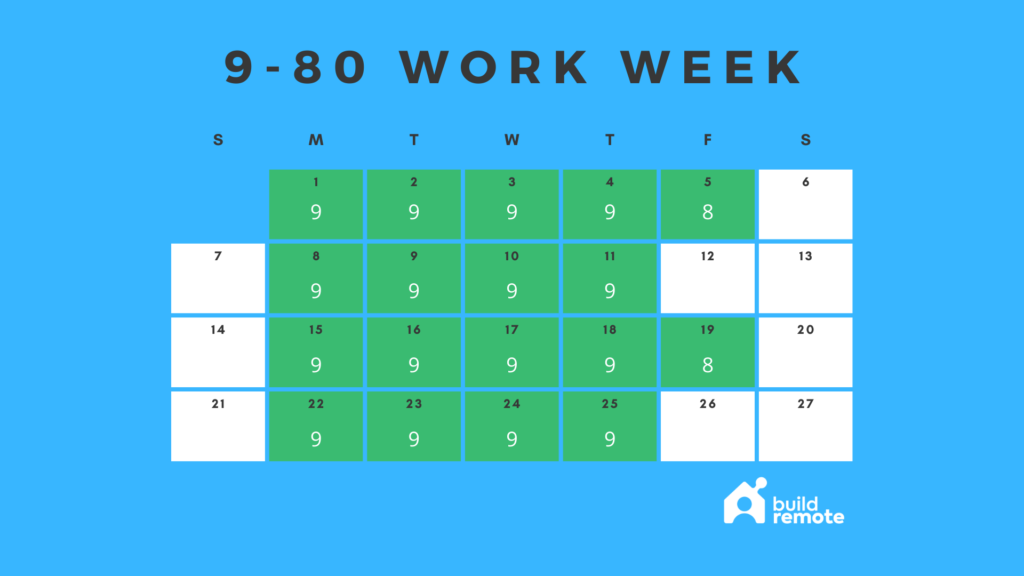
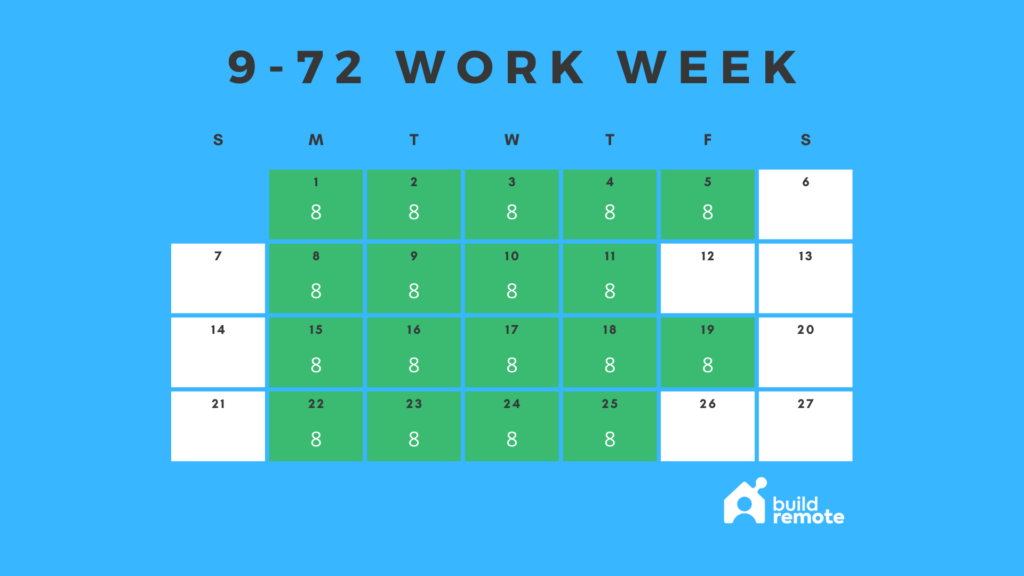
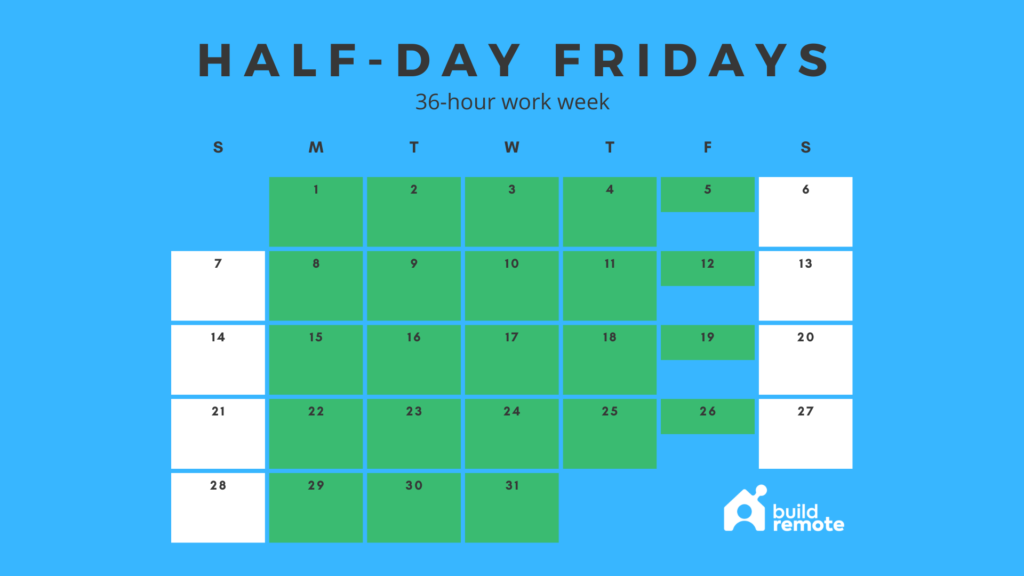



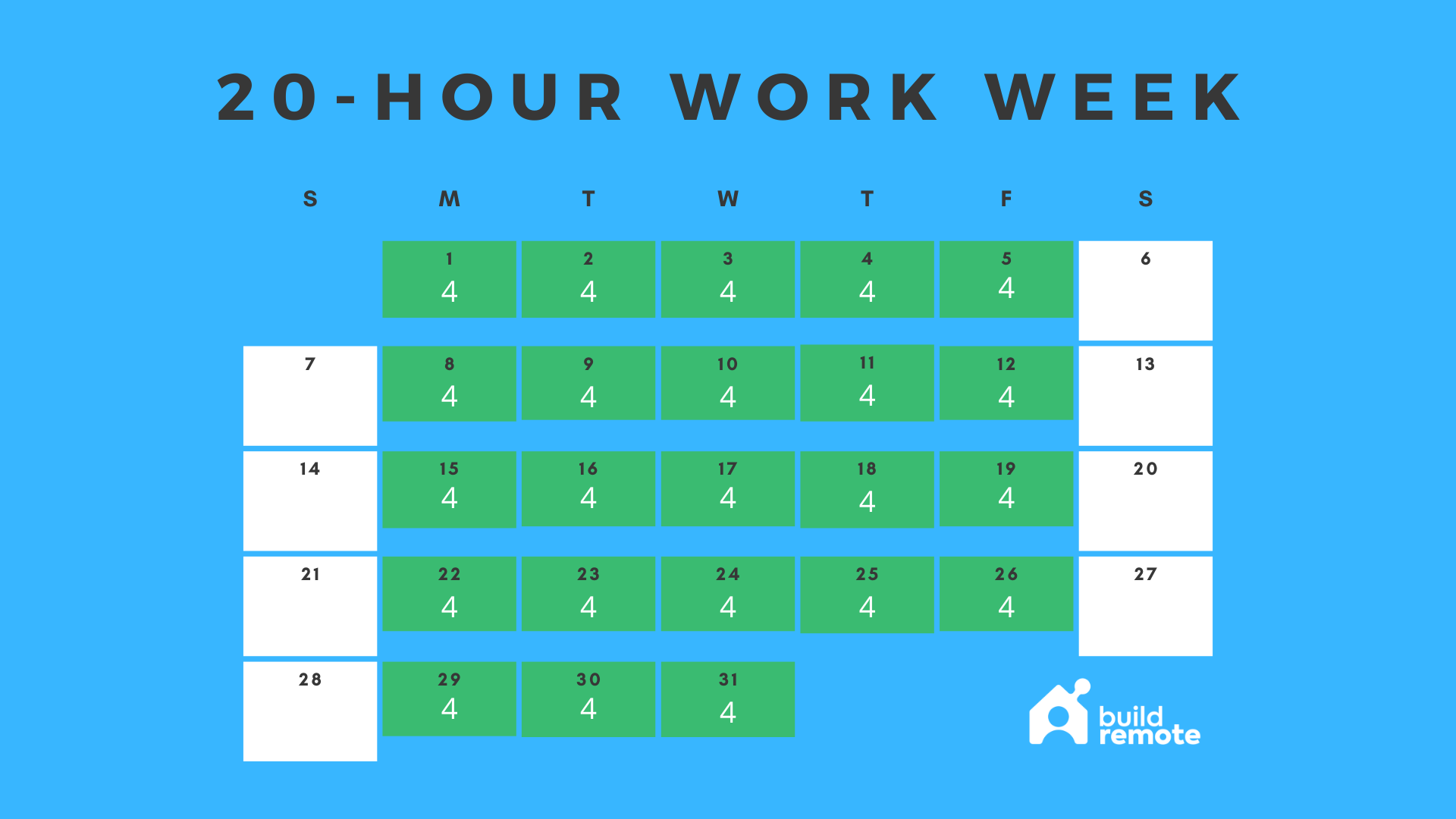
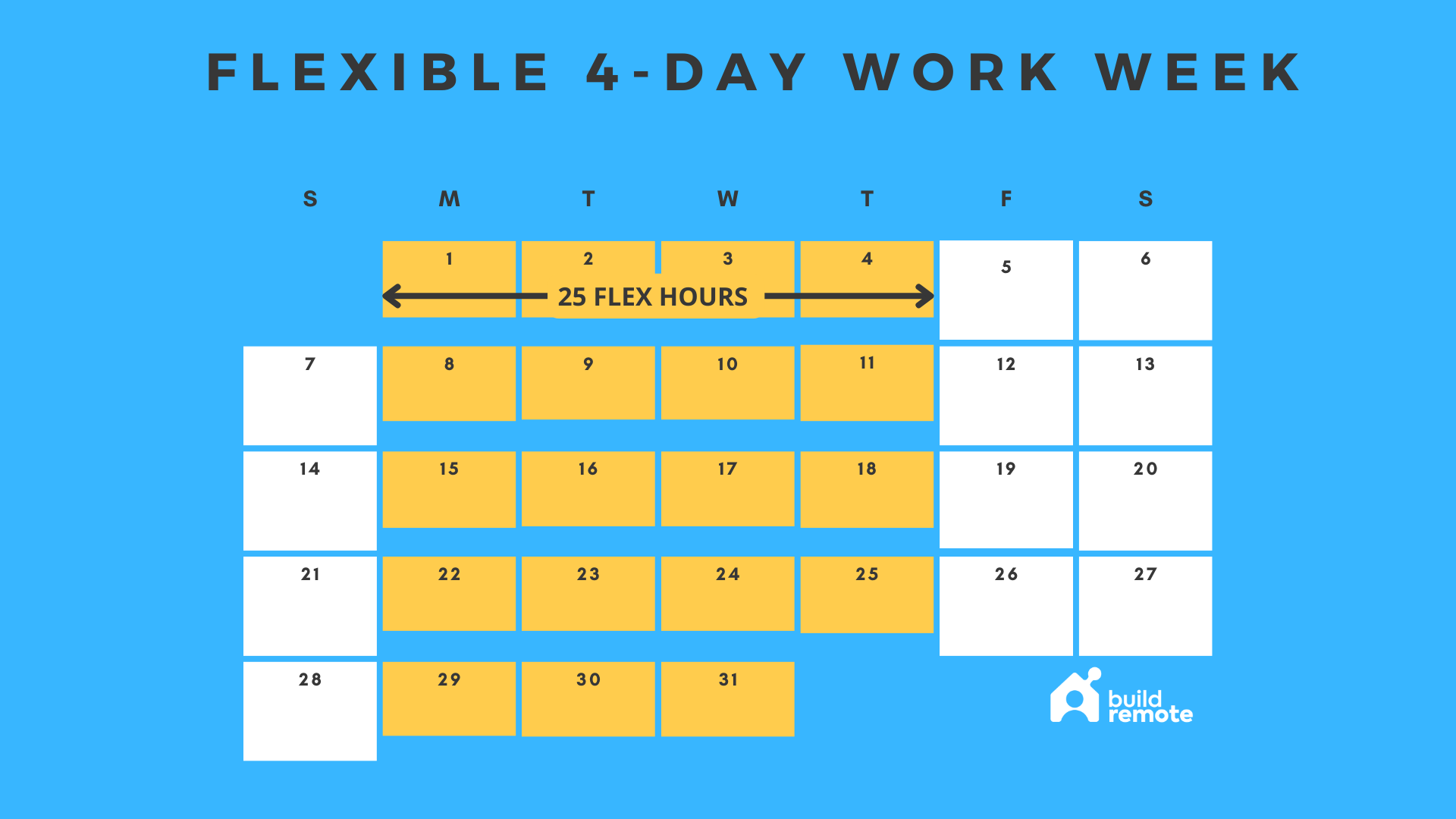
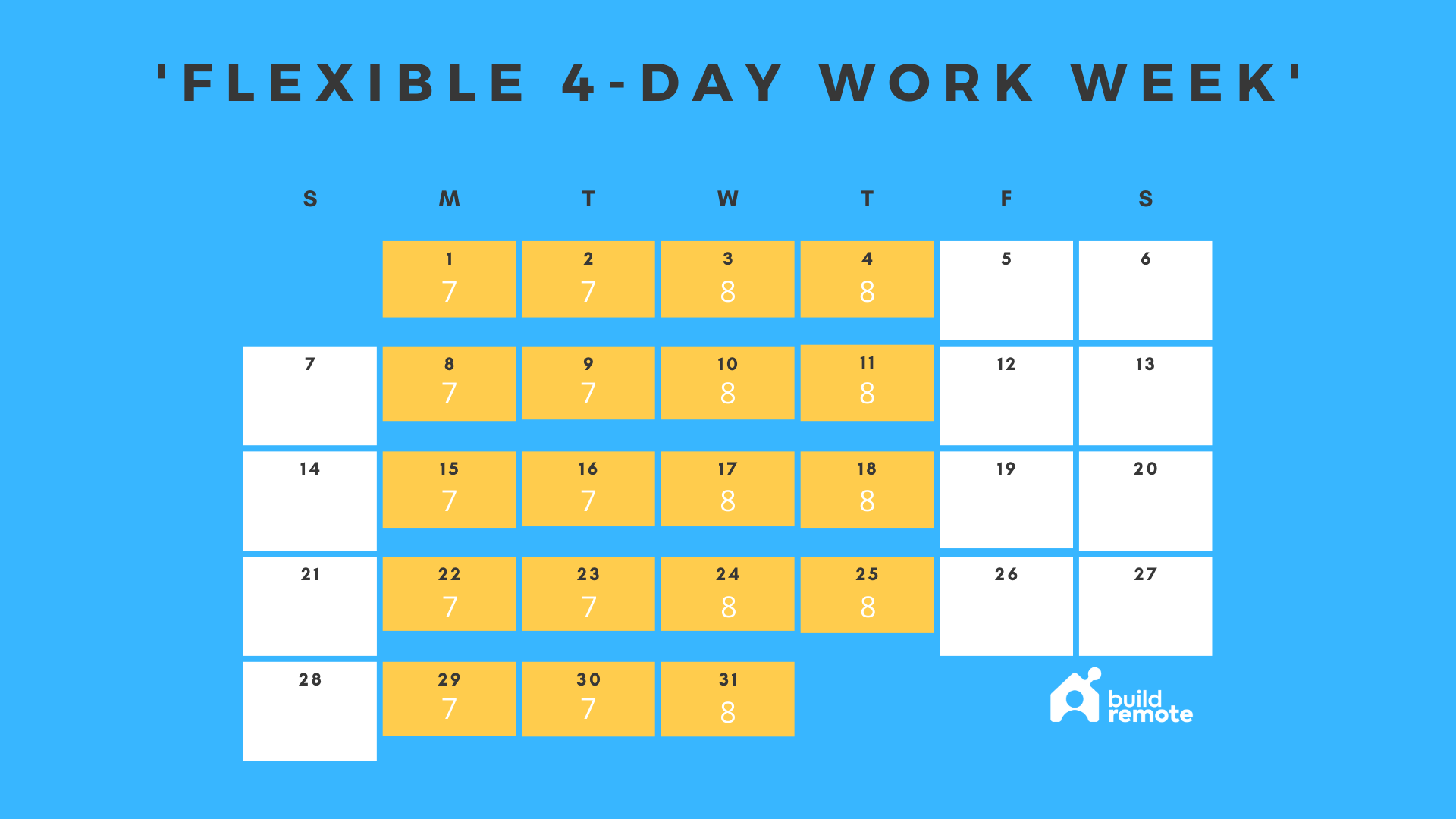
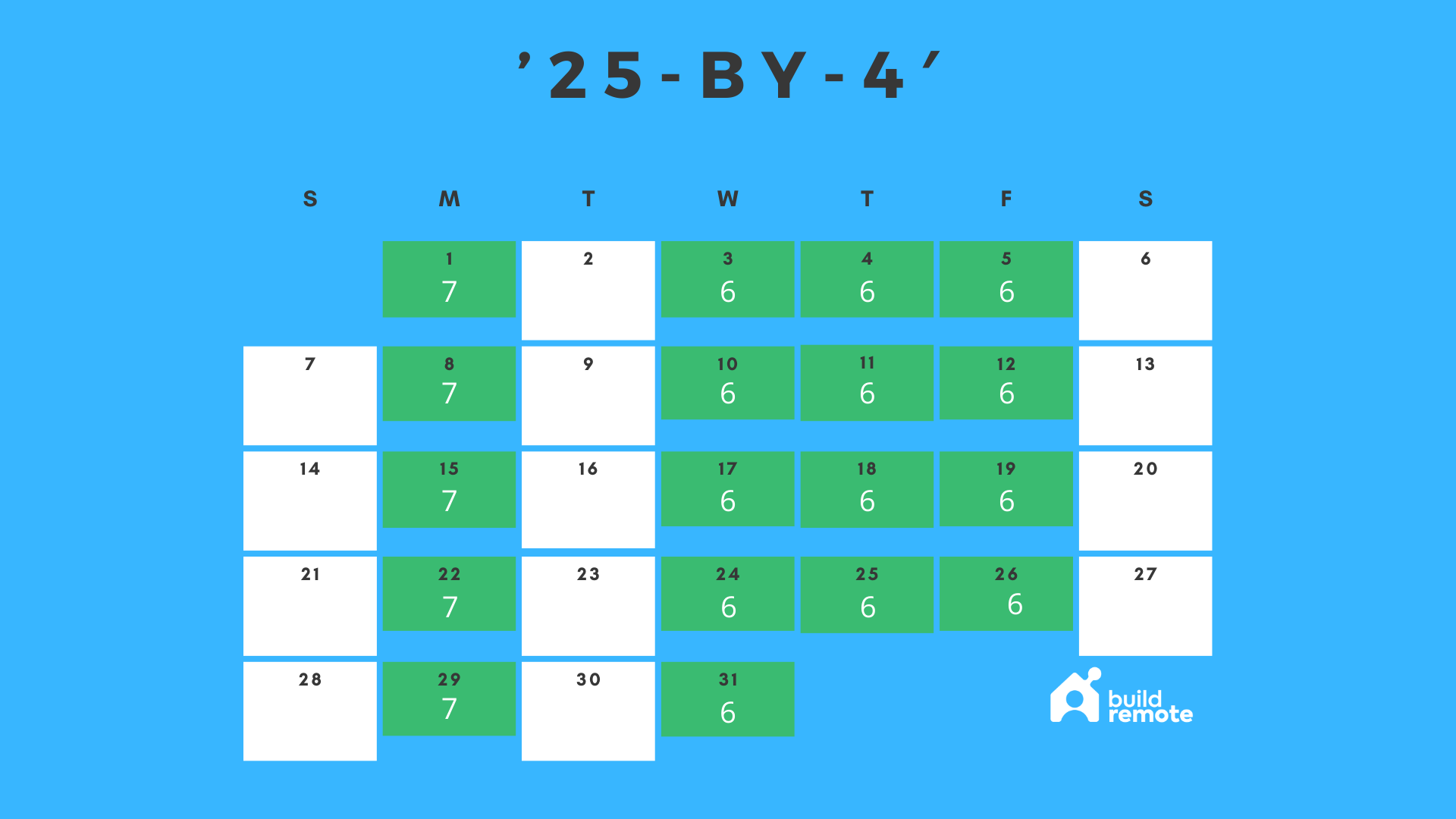
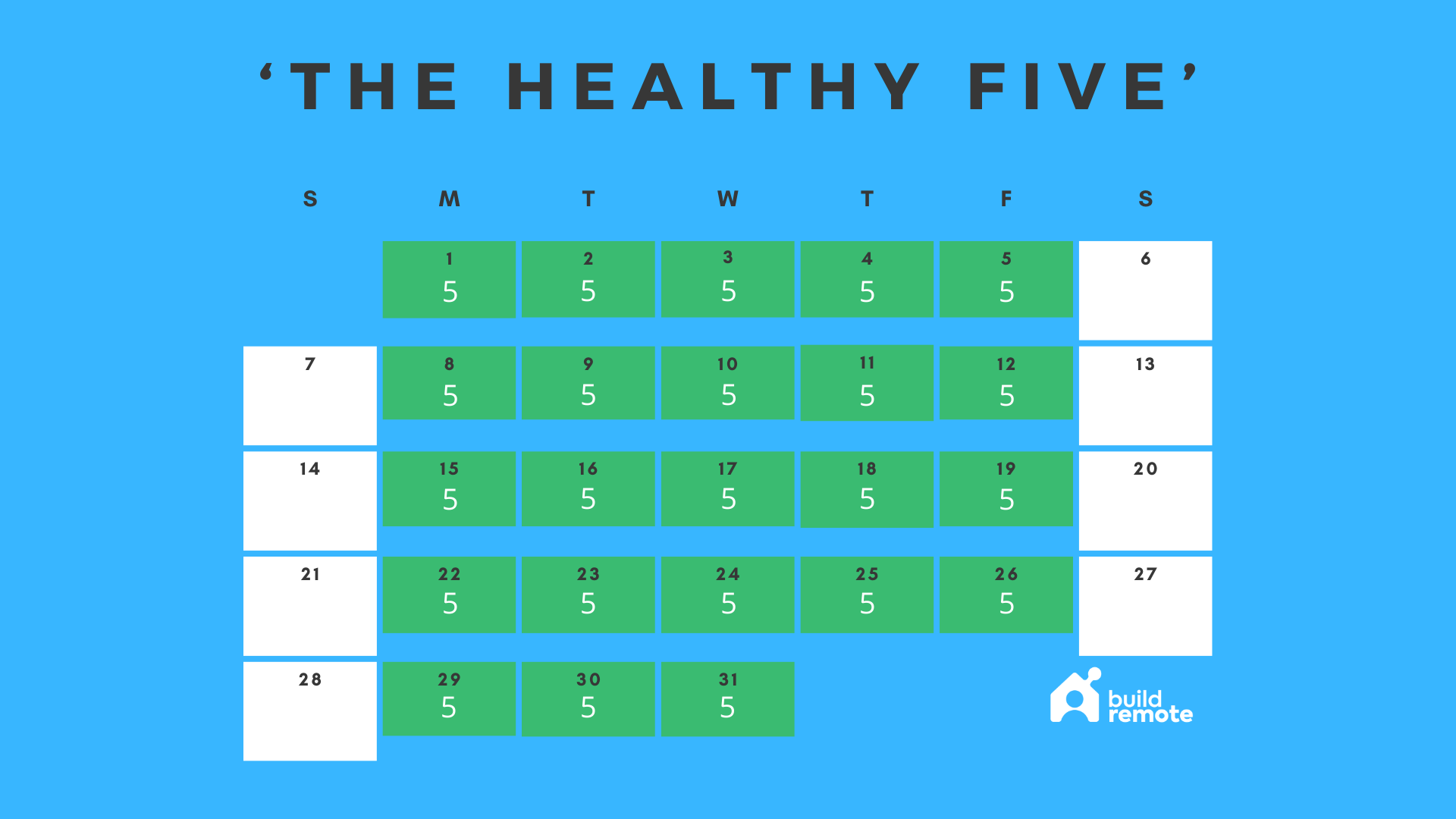
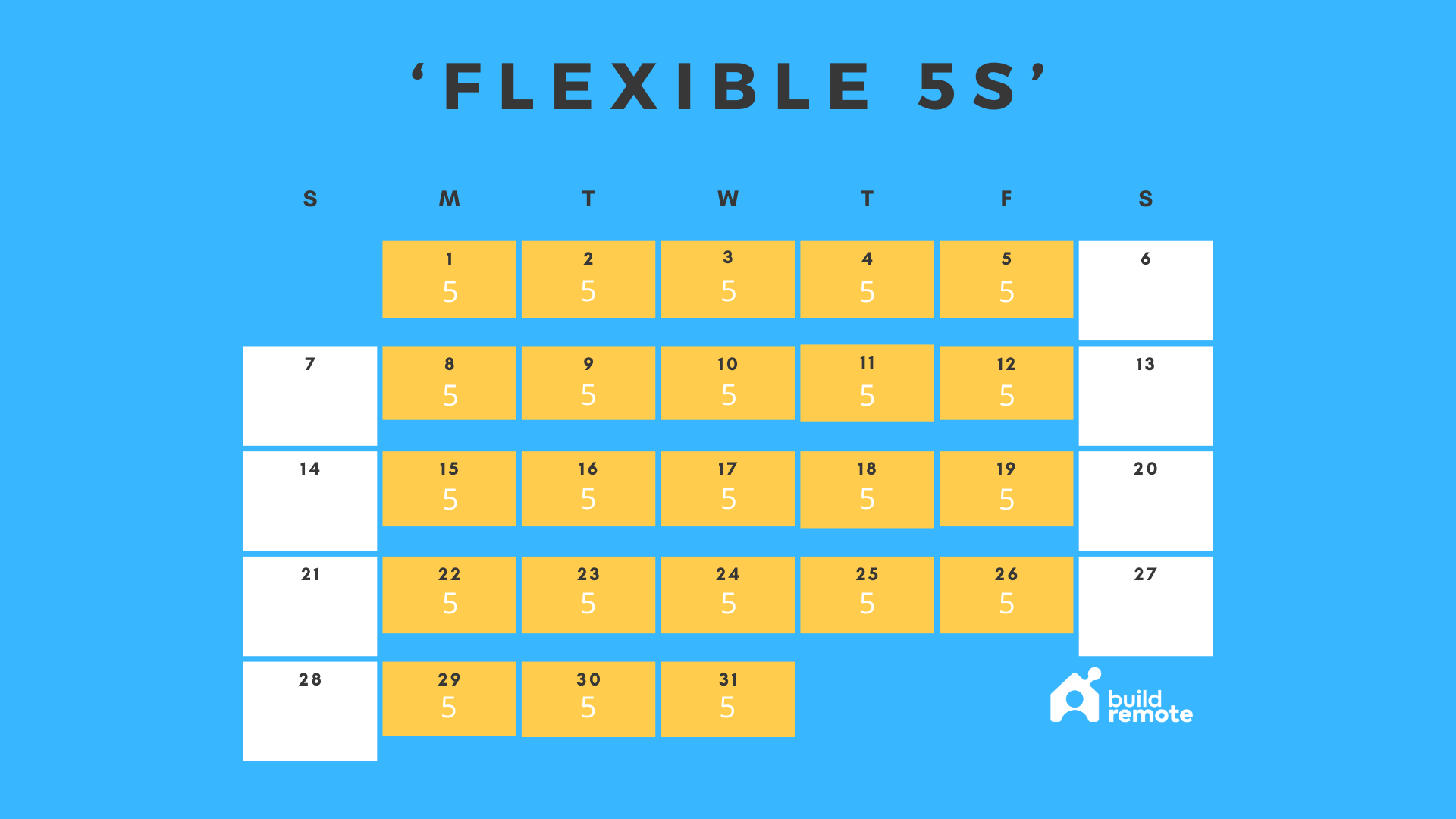
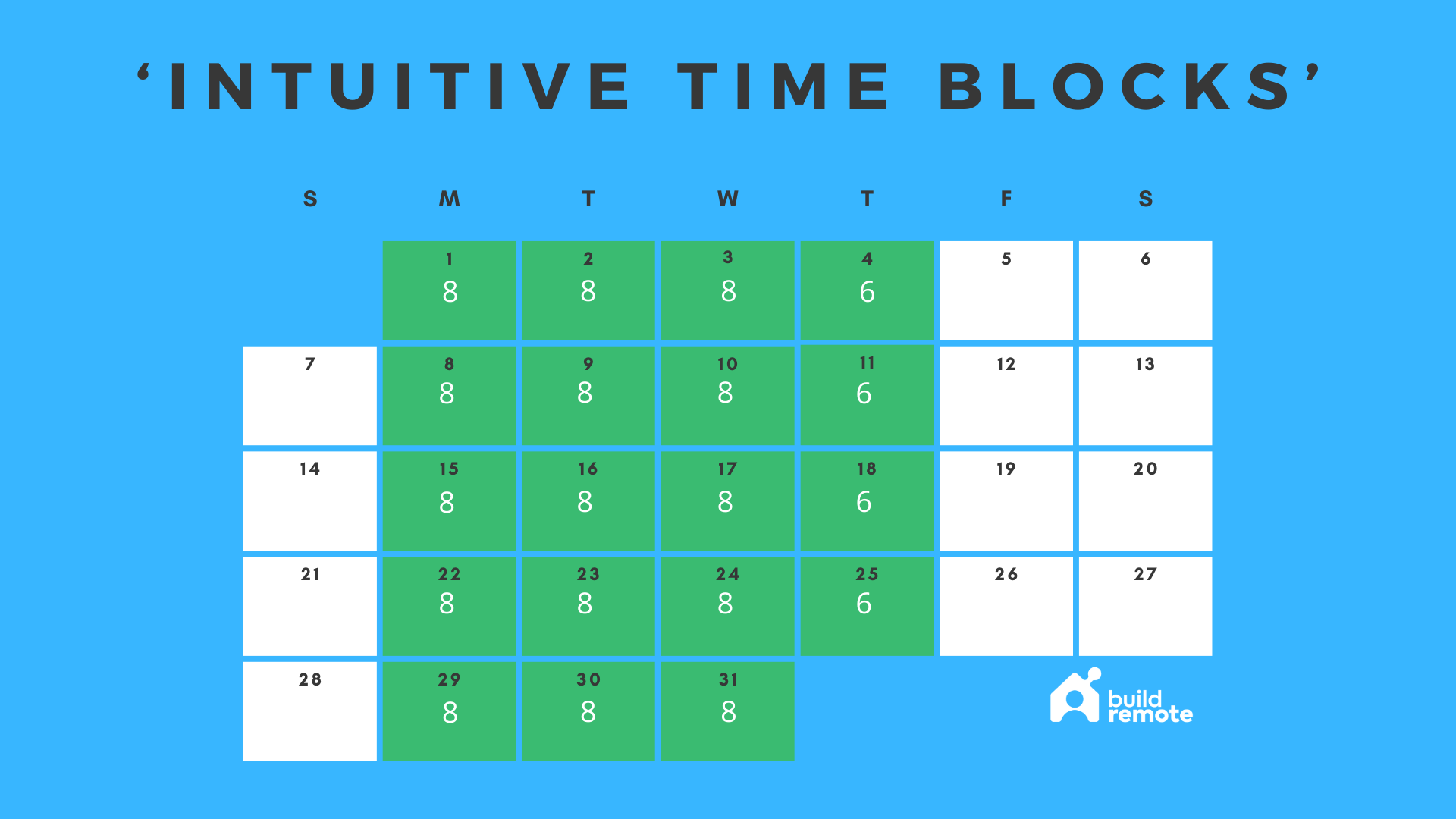
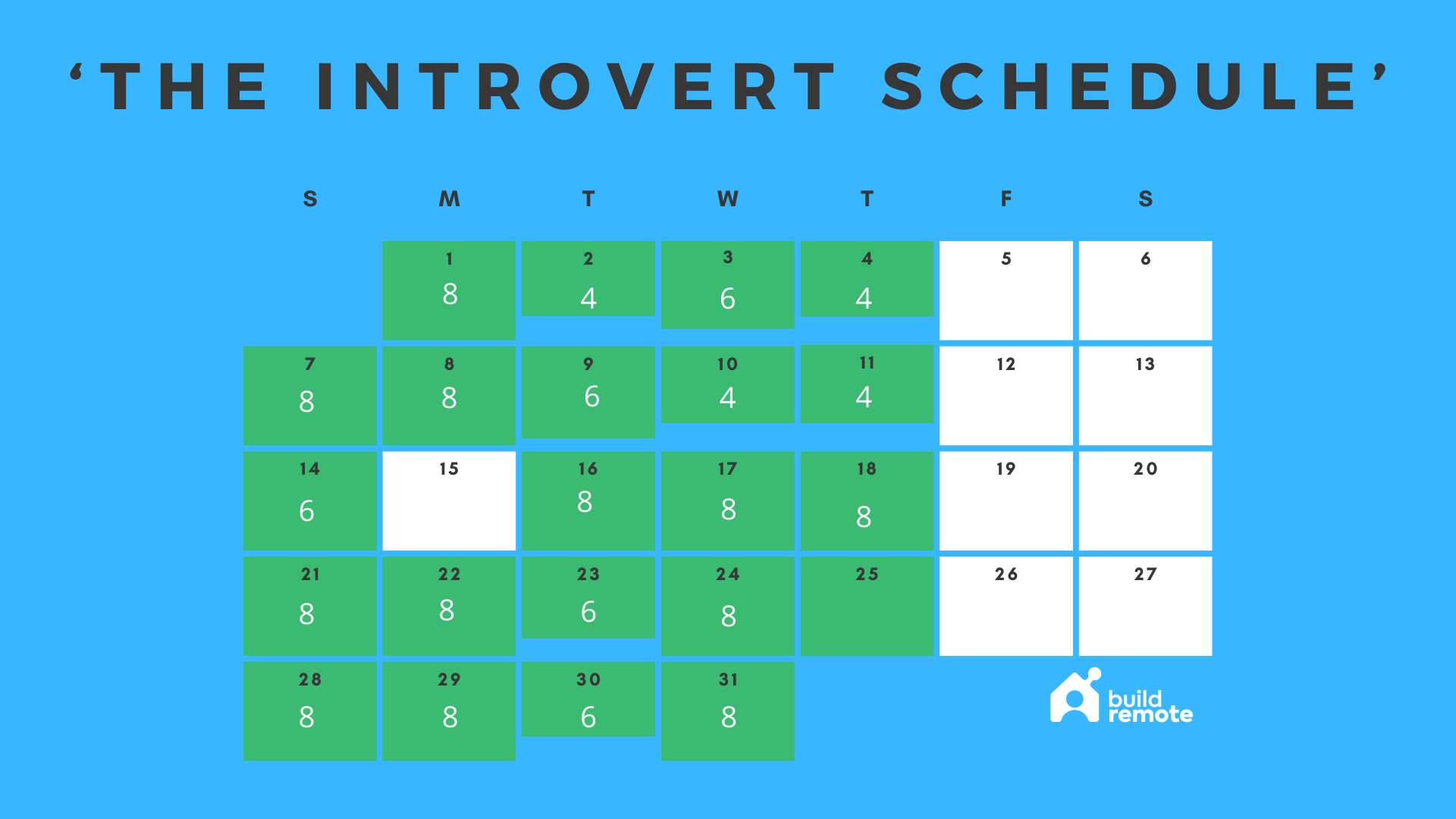
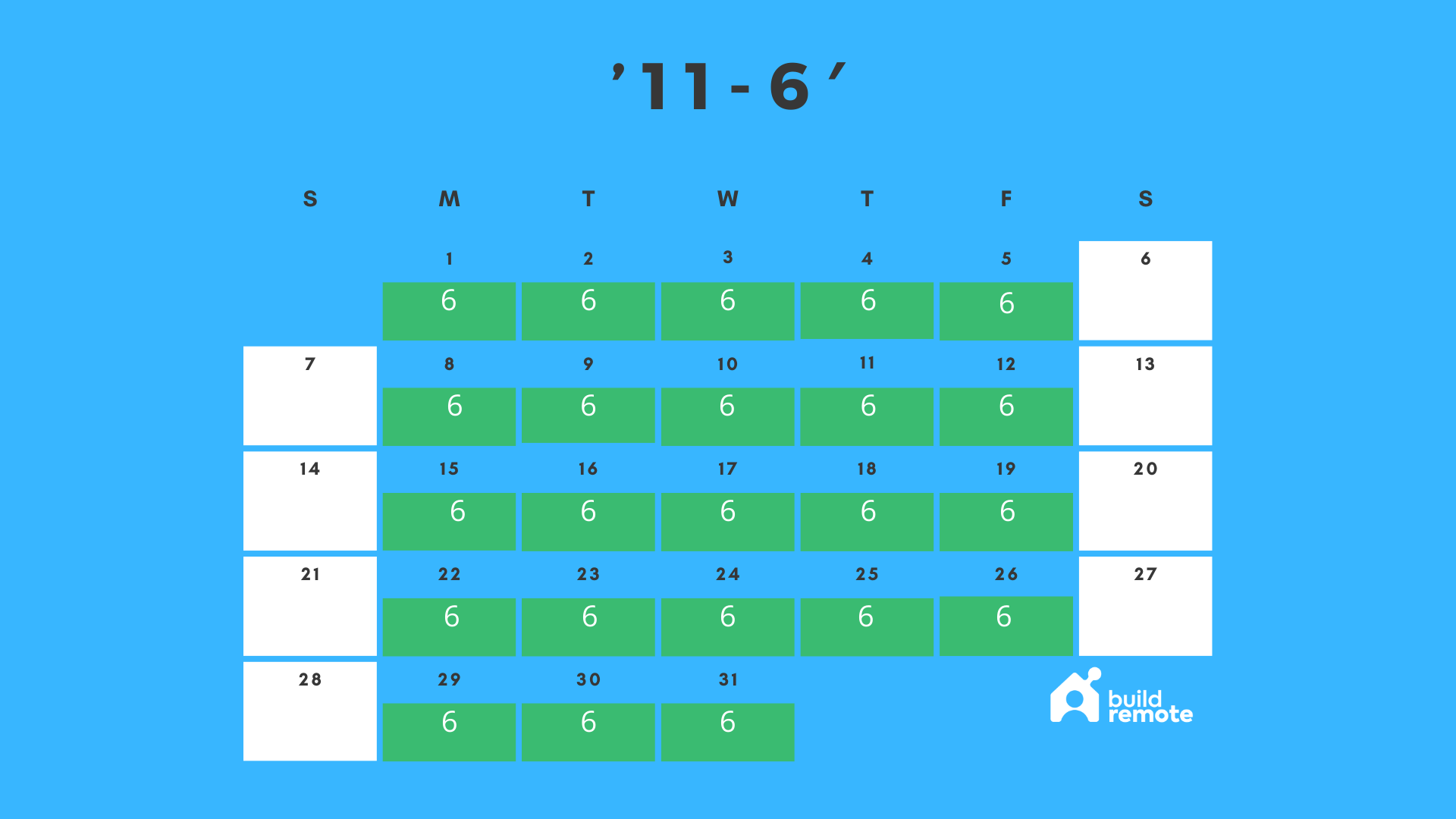
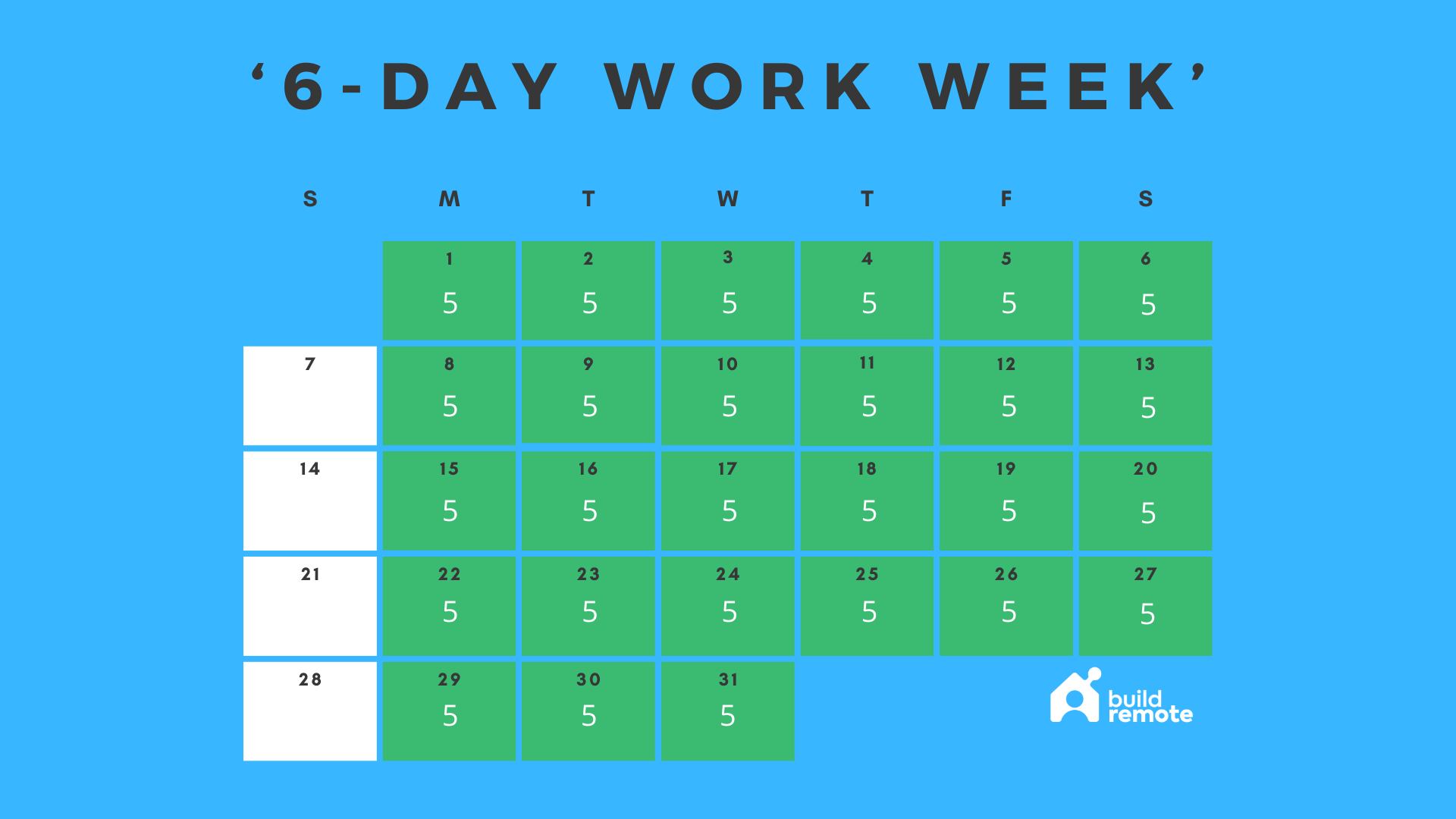
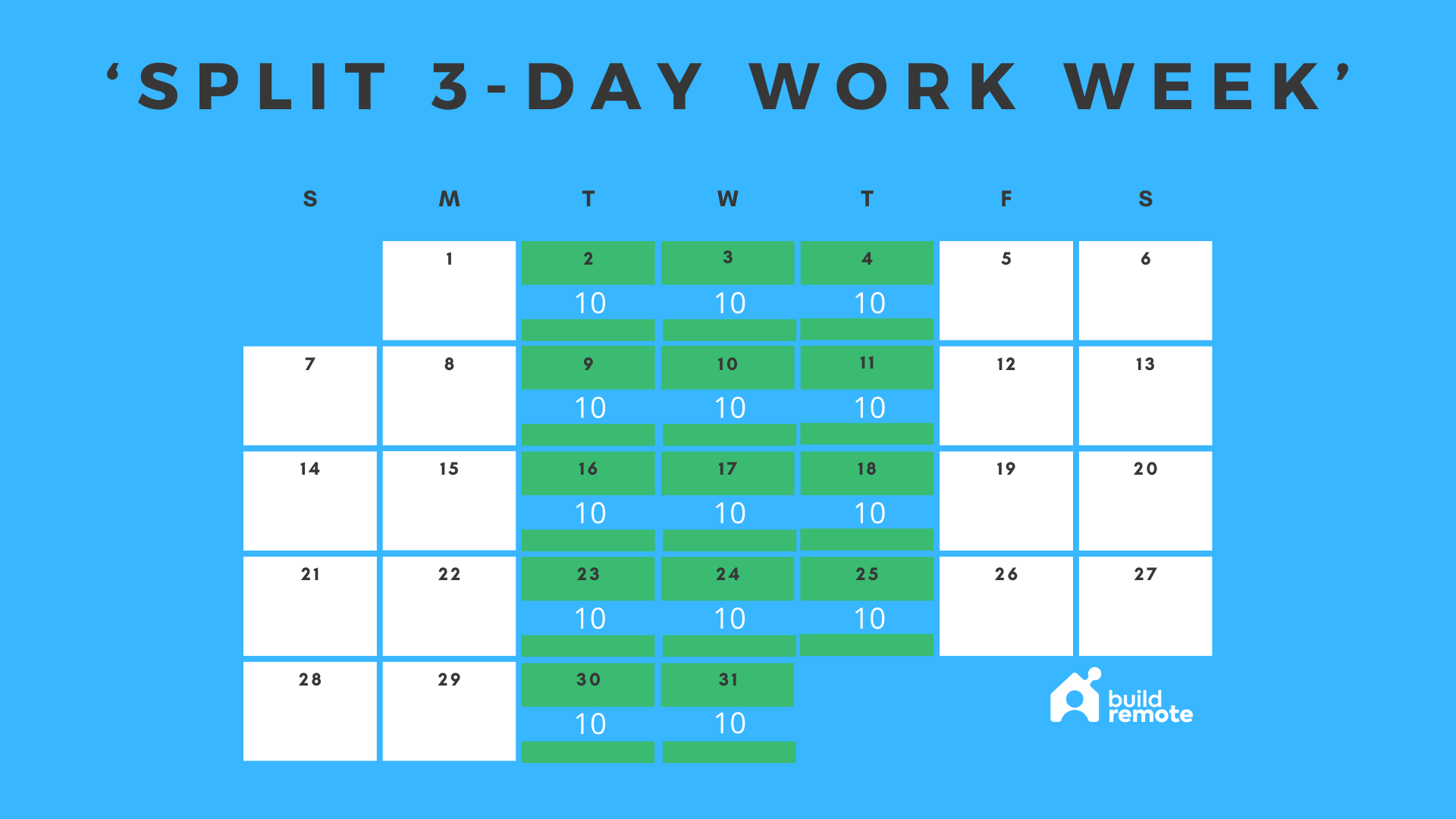
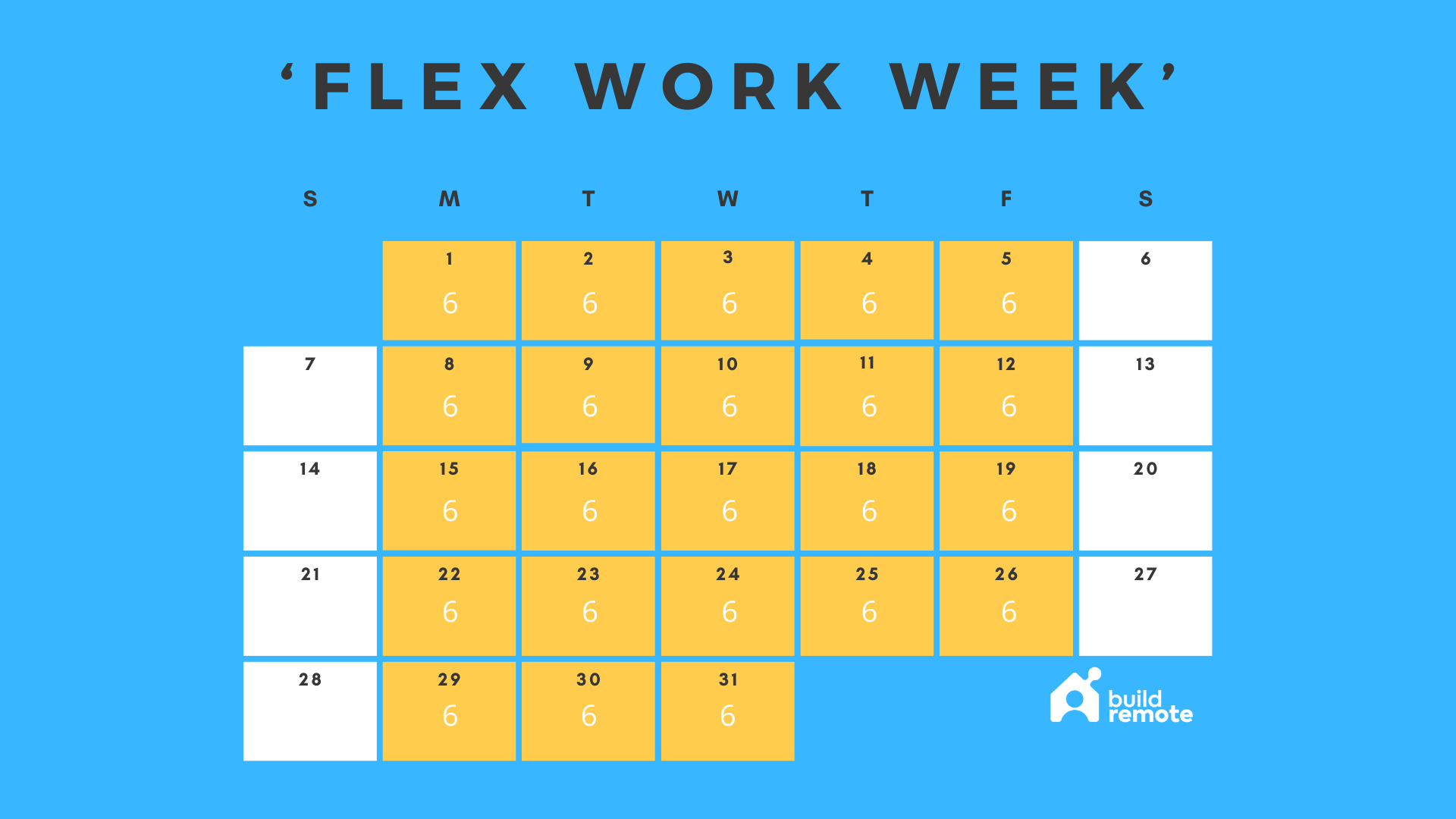
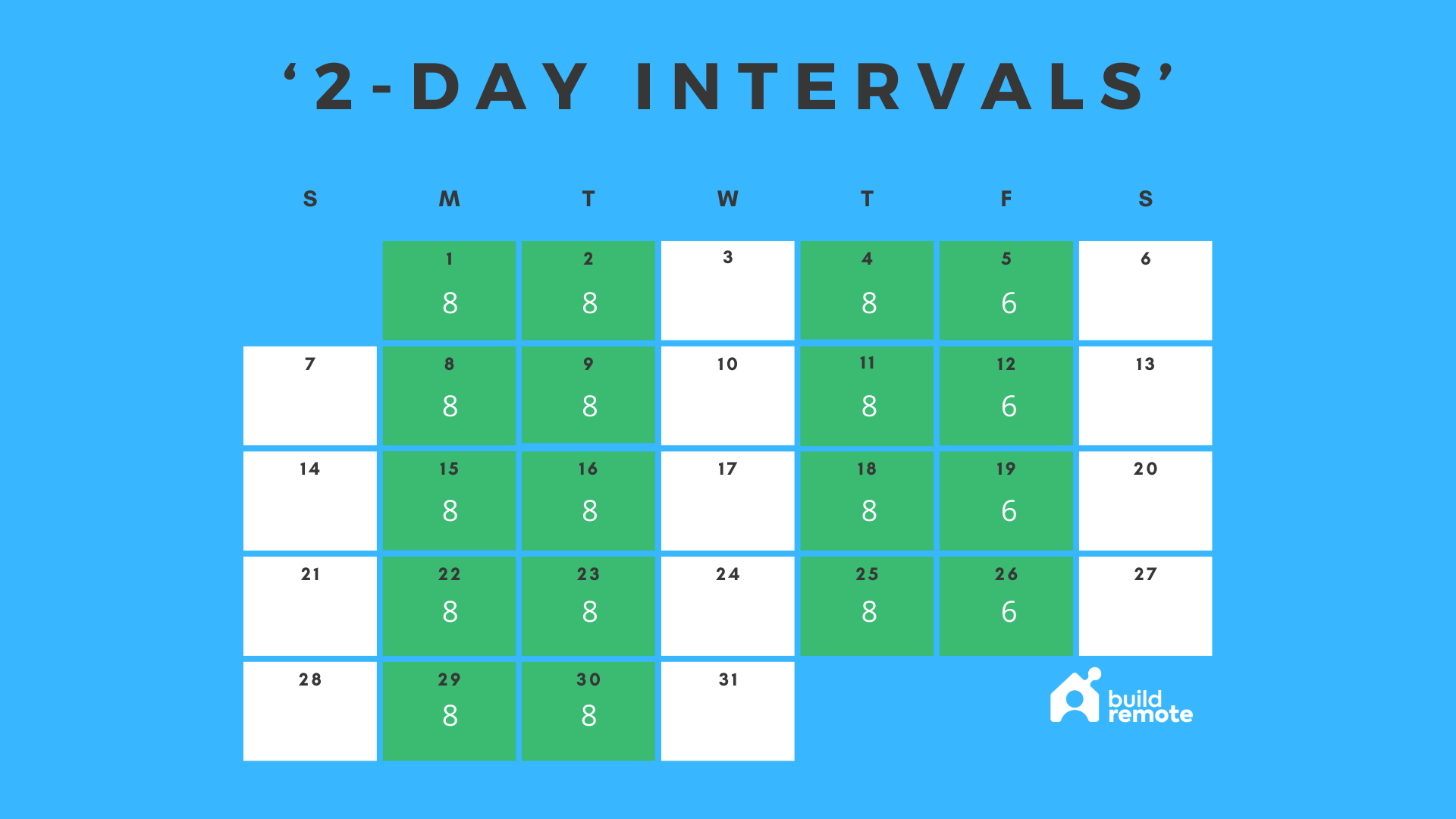

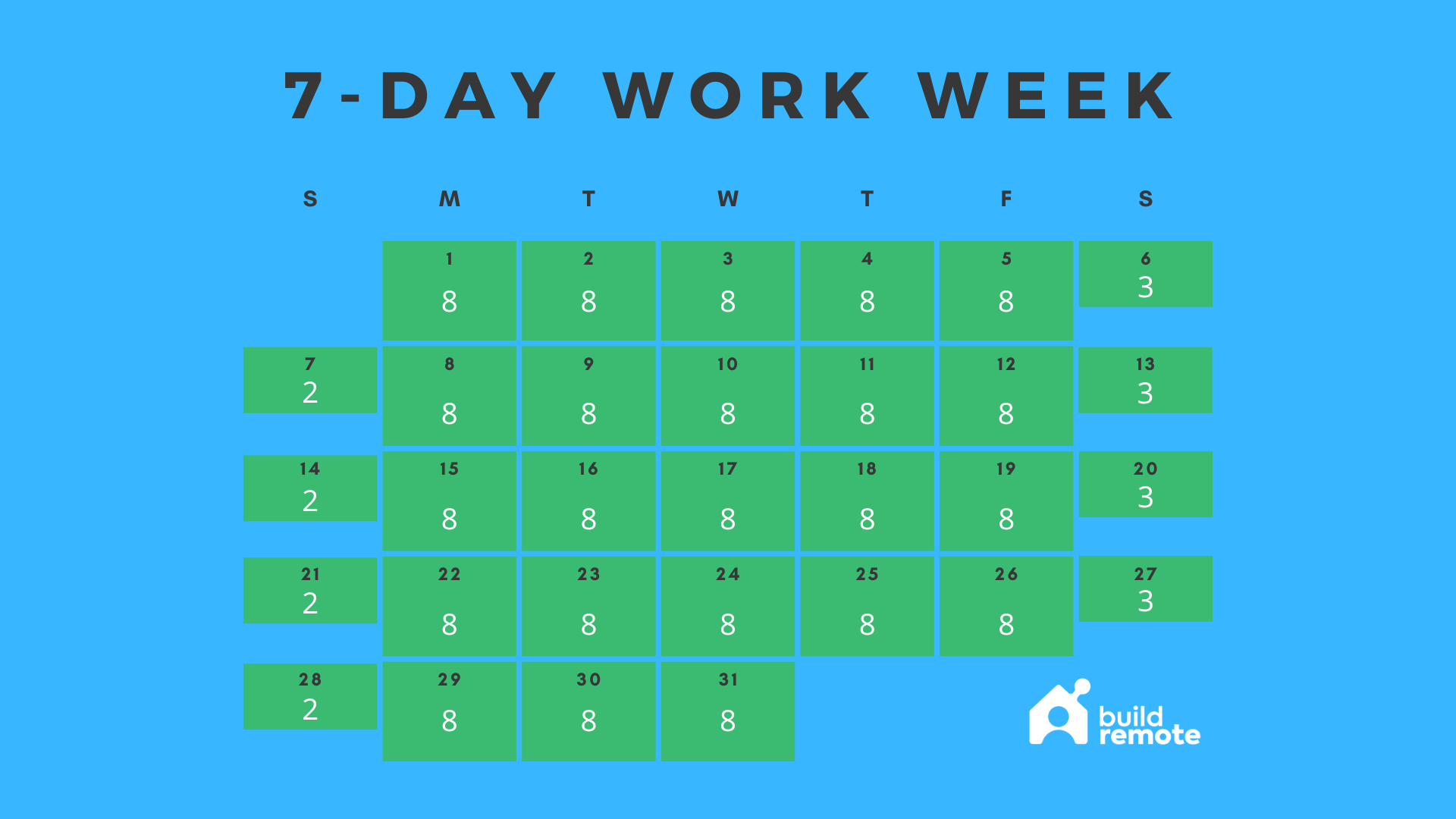
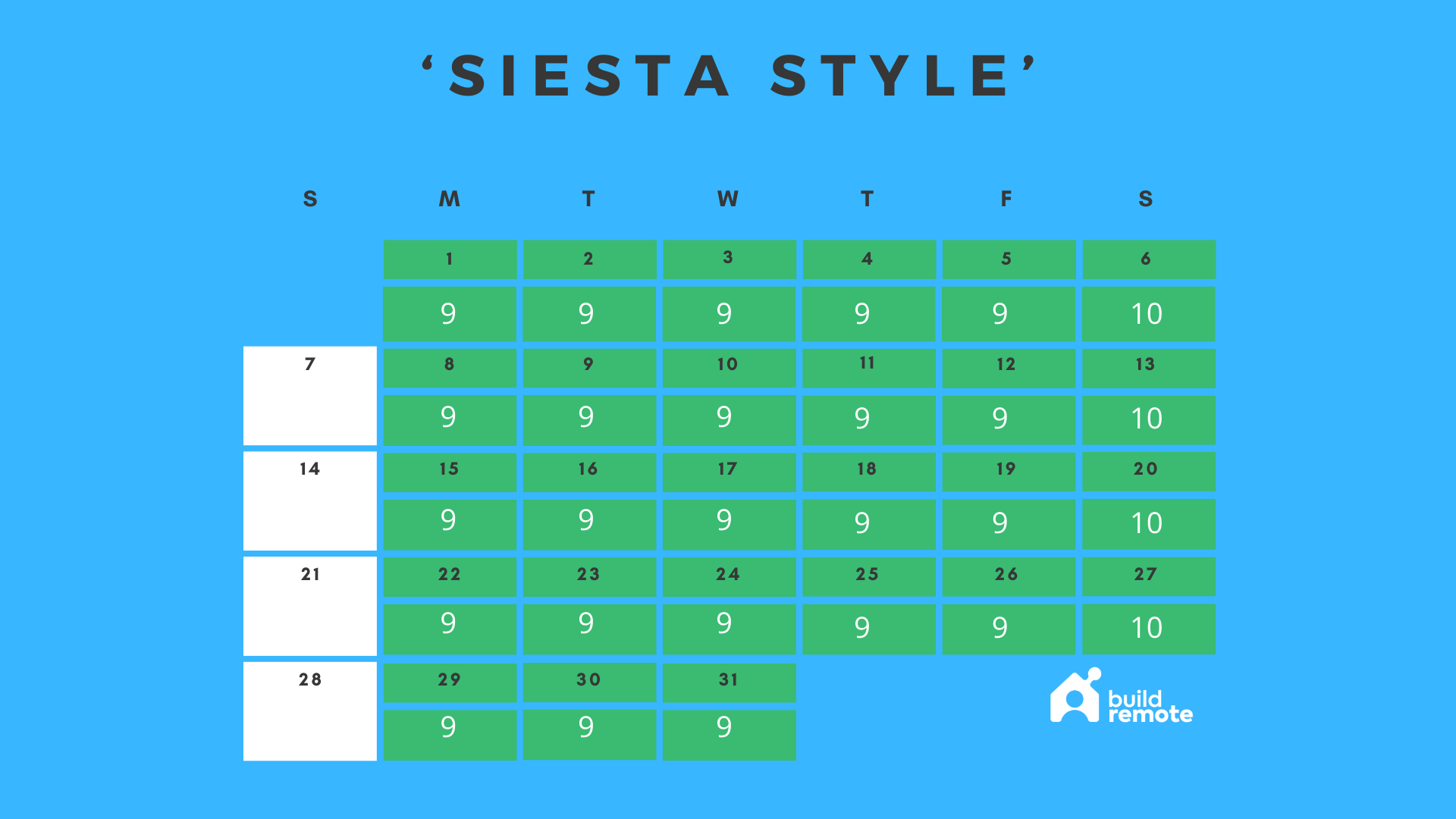
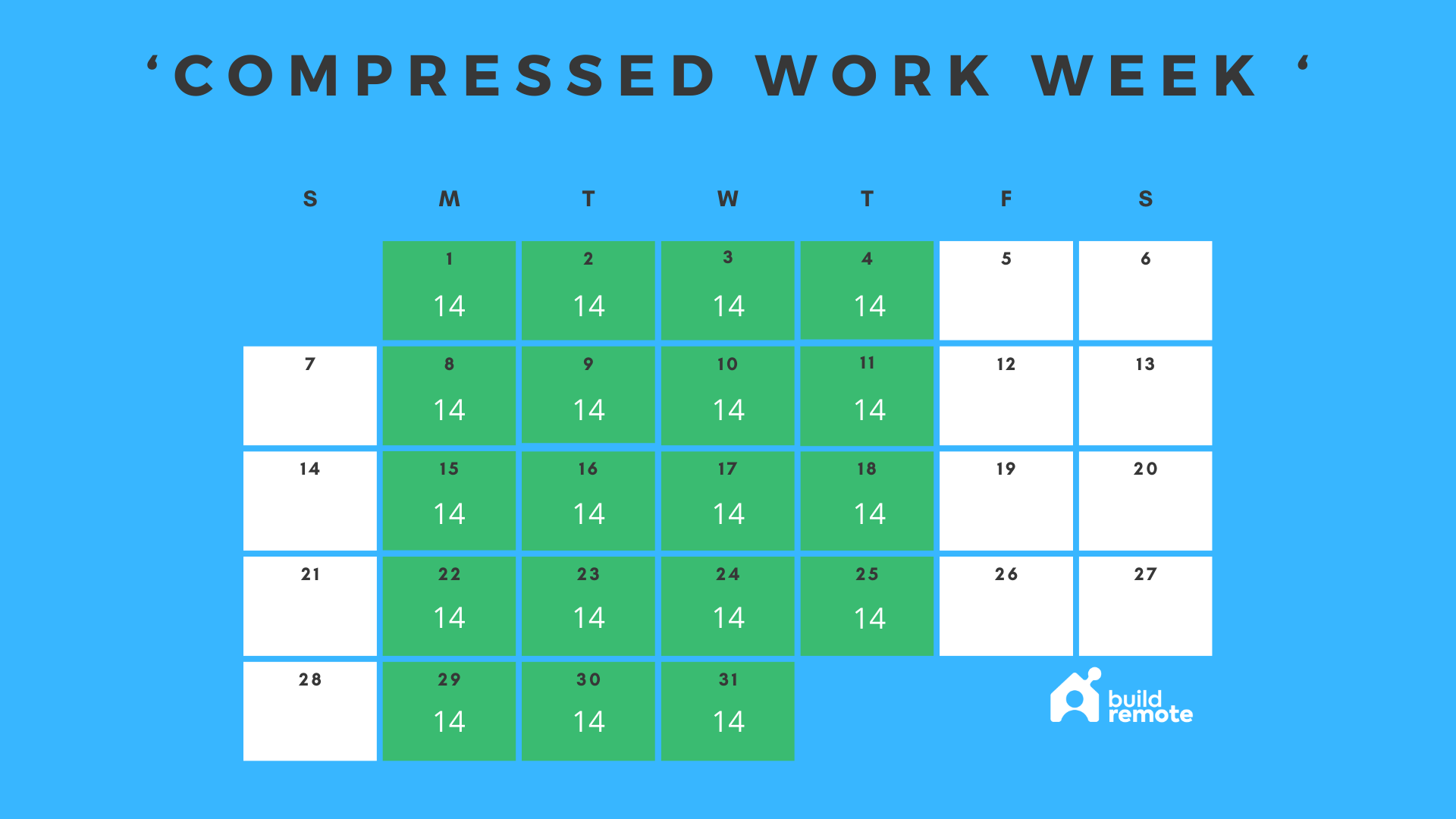
Maybe aside from the different hours worked etc in different workweek schedules, it’ll be nice to know what futher differentiate them, which one would be better like a kind of comparison in terms of benefits and drawbacks maybe. Just an idea